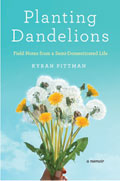
Three weeks into advent, we finally remember to light our candle wreath. Two purple, one rose. Anglicans say the rose candle is for "joyful anticipation." I've been an Episcopalian myself for nearly a decade, and I've yet to see a public display of "joyful anticipation" on the face of any white Anglican older than eight, so I borrow from my Catholic roots, and say it is for Mary, for the mother.
It's a rare leisurely meal and the candlelight kindles storytelling. Patrick tells the boys about Christmases past, years when his family filled and overflowed the house that belonged to his grandmother Geneva, widow of the ragman, all long gone. As he enumerates kin, the boys' eyes grow wide. It's hard for them to imagine. In the five years between 1998, the year I became pregnant with our first son, and 2003, a year before the birth of our last, we lost three of our four parents, and both my grandmothers. My mother lives half a world away. They don't know the kind of family gatherings we did as children.
Baby boy, at three and a half, perceives the absences outlined by these stories. He climbs into my lap, and with both hands pulls my face towards his. "Who grandfather's name called?" he whispers.
"Al," I tell him. "And Patrick. Poppy and PawPaw."
"Who grandmother's name?"
"Nanny."
"Who other grandmother's name called?"
"Honey."
"Honey," he repeats.
Old grief is a gypsy robber. Sometimes it picks your pocket slyly in a crowd. Sometimes it's steel to your gut. Your knees hit the ground and you're breathless.
I gaze into the flame of the rose candle. Not in joyful anticipation, but with thought for La Virgen María de los Dolores, "Virgin Mary of Sorrows." When Patrick and I exiled ourselves to Mexico, it was the season of Lent, and there was a local fiesta dedicated to the sorrowful Mother, where people displayed elaborate house shrines to the Virgin, adorned with wheat grass and bitter oranges.
I was in fresh, raw grief at the time, mourning the end of my first marriage. It was the kind of grief that makes every breath an effort, a decision. It sounds very romantic to say I ran off to Mexico, but the truth is, I spent most of my days there in a fog. The Night of the Altars pierced it. Sorrow and loss was allowed. I wanted to gather all the oranges into my arms, bite them through their skins. I began to understand that the pain wouldn't let go of me until I clasped it first.
I sometimes think we haven't been able to gather in the pain of losing our parents. As they were going, our children were coming. There hasn't been time or space. In the case of Patrick's parents, I'm not sure we've ever come out of shock. Even my dad's death, more expected, still seems unreal. My mother and sister experience his absence nearly every day, but I only encounter it when I visit. I remember riding in the back of a car with my sister in front of me on the way to mom's from the airport a few years ago. My sister was saying, "When Dad died...," and I could hear this voice inside my head, asking "
What did she say?"
My husband doesn't have the geographic disconnect, but he also manages to get around the gaping hole. We don't visit Patrick's parents' graves, a half-hour drive. We almost never get together with his brother's family, although our relationship with them is genuinely warm. Apart from Christmas cards exchanged with a steadfast few, we don't see or hear from relatives or friends of his parents. Patrick's never been back to the house his father sold soon after his mother died. It's as if the entire space they carved out in the world simply closed over.
Every year, my children's schools have a grandparents' day, and every year I have to scramble to come up with a substitute grandparent for them each. Once, the best I could do was get a co-worker they'd never met. The schools insist I come up with somebody. This year, I had someone lined up who they did know and love, but she got the dates mixed up, and missed. She felt terrible, and so did I, but in the middle of apologizing to them, I decided that they and I needed to accept reality. The reality, I told them, is that they only have one grandparent, and she lives 2,500 miles away, and it's very sad, but that's just the way it is. And grandparents' day is probably always going to be a drag because of it.
Sorrow and loss are allowed.
I have to tell myself that at the dinner table tonight when Patrick describes for the boys how deeply the presents would be piled under his tree.
Oh, don't tell them that, I think. I don't want my children to feel lack. But they do lack, and it's not in presents. It's in three wonderful people who would have loved them unconditionally, and indulged them shamelessly, the way only grandparents can do. It's a huge hole in their lives, and no amount of wishful thinking on my part can smooth it over. Even my three year old, the only child to never meet any of them, understands that they are missing, and misses them.
I have to let him. Even if it means I have to miss them too.
Next advent, I want to sprout wheat grass, and find bitter oranges to decorate the mantle and the candle wreath, along with the nuts and pinecones. I need to teach my children and remind myself, even in the midst of joyful anticipation, that sorrow and loss are allowed.
Labels: merry merry, soul and spirit, the way we were
this post lives all by itself here
























